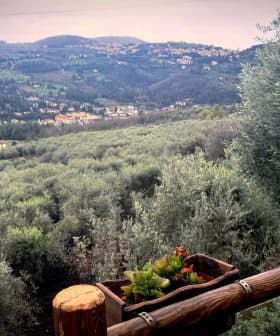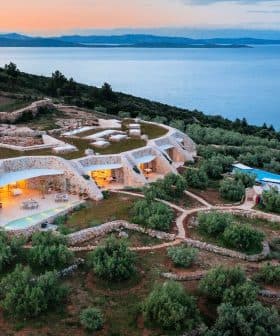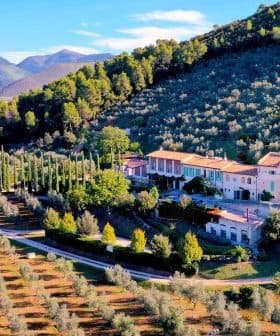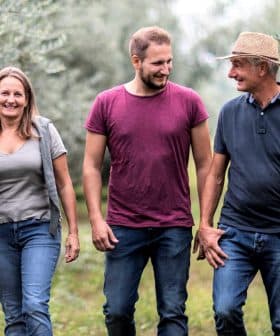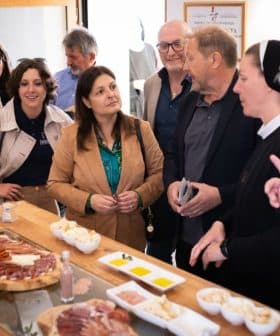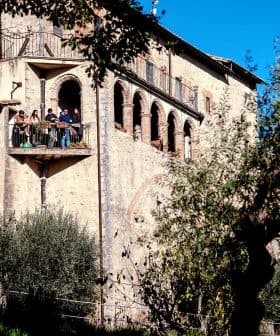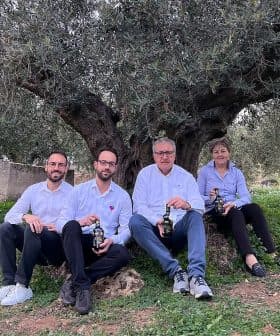Apulian Village Bets on Olive Growing Heritage to Revive Economy
Orsara, a small Apulian village, is using its ancient olive oil production tradition to boost its economy and promote sustainability and tourism.
 Officials and farmers in Orsara bet an ancient olive growing tradition will inspire tourism and new economic growth (Photo: Osara City Council)
Officials and farmers in Orsara bet an ancient olive growing tradition will inspire tourism and new economic growth (Photo: Osara City Council) The small village of Orsara in Italy is focusing on its ancient olive oil production tradition to boost its economy and promote the region, with efforts to create a unique olive oil brand and involve local producers in sustainable practices. The initiative includes training courses for residents to become certified olive pruners, emphasizing the importance of young farmers in revitalizing the olive oil sector and embracing innovative approaches to agriculture.
A small Apulian village is betting on its millennia-old olive oil production tradition to revive its economy and give new value to the region.
Nestled in the Dauni Mountains in the province of Foggia, Orsara is home to a community of 2,500 residents, known for unusual health and longevity.
“The idea came to us while visiting and restoring the agricultural pathways in our countryside,” Michele Terlizzi, delegated councilor for agriculture, veterinary doctor and olive grower, told Olive Oil Times.
See Also:Revitalizing Salento — Entrepreneurs Fight Xylella with New Ideas“There are so many centuries-old trees, families involved in olive oil production, beautiful landscapes and olive mills,” he added.
Most local olive oil production comes from more than 20,000 olive trees, predominantly of the Ogliarola cultivar, with some Coratina and Leccino varieties.
Local extra virgin olive oil is known for its exceptionally low acidity, often below 0.2 percent.
“As the municipal administration, we realized that we had the opportunity to give our unique olive oil tradition the place it deserves in Orsara’s present and future,” he said.
The first step has been formally joining the nationwide network of Città dell’Olio (Olive Oil Municipalities).
This well-established association actively promotes sustainability and highlights the unique history and features of olive-growing territories across Italy.
“The second step was involving local professional producers, some of whom immediately embraced a path that would lead to the creation of an Orsara-specific olive oil brand,” Terlizzi said.
Producers and local administrators are developing guidelines to institutionalize agricultural practices rooted in local traditions to achieve this goal.
“It’s not ready yet, but the guidelines will include provisions such as a zero-pesticides policy,” Terlizzi said.
“Our methods are based on tradition, centered around traditional orchards. Intensive olive farming isn’t part of our tradition,” he added.
According to the council, the new Orsara olive oil brand will emphasize soil nourishment and biodiversity-enhancing techniques, such as shredding prunings instead of removing them and employing treatments based on soil analysis.
Kaolin and zeolite treatments will replace chemical substances that may harm biodiversity.
“By adopting shared practices within the same territory, growers will support each other,” Terlizzi said. “For example, if a grower receives an order for large quantities of extra virgin olive oil, they could partner with other local producers to fulfill it.”
“Another important step is creating job opportunities in the olive oil sector for younger generations,” he added.
The municipality has partnered with Giorgio Pannelli’s pruning school to hold upcoming courses directly in Orsara.
“The council will fund the courses, enabling more residents to become certified olive pruners,” Terlizzi said.
Pannelli, a researcher at the Olive Research Center (CRA) in Perugia, central Italy, is among the promoters of the simplified polyconic vase pruning technique, a fast and highly efficient method gaining popularity across Italy.
According to local officials, the active participation of local growers is a crucial factor in the initiative’s success.
Mario Simonelli, mayor of Orsara, emphasized that the project’s greatest asset is the enthusiasm and energy of young farmers.
“Young producers are adopting innovative approaches focused on organic farming and multifunctionality,” he said. “We intend to support this path, enhancing our ancient traditions and turning them into modern opportunities for growth.”
“On average, olive growers here are 40 years old,” Terlizzi highlighted, emphasizing their initiative and contemporary approach to agriculture.
This is significant, considering that the National Agency for Agricultural Market Services (Ismea) has identified the aging population of olive growers as one of the main challenges facing the Italian olive sector.
This demographic trend is believed to hamper the adoption of new technologies and innovative practices in olive oil production.
In 2021, Ismea calculated that for every olive grower under 40, there were eleven growers over 65 nationally.
The first producers joining the Orsara initiative are featured in early promotional materials created by the administration. “But the initiative remains open to all local producers who can join at any time,” Terlizzi remarked.
Alongside these initiatives, Orsara officials support expanding olive-growing areas and recovering abandoned groves.
“This morning, we were unloading more than 100 new olive saplings,” Terlizzi said.
Oleotourism will play a significant role in the municipality’s plans.
“Tourists visiting Orsara will not only be able to buy some of the finest extra virgin olive oil from Puglia but will also experience firsthand how it’s produced, visiting the olive groves and the ancient trees from which it comes,” Terlizzi said.
Visitors will also be able to immerse themselves in the history of local olive orchards.
“For example, in the past, local marriage agreements between two families always included an olive orchard as part of the dowry,” Terlizzi recalled. “The aim was clear, new families needed their own olive oil.”
In addition to olives, honey and other agricultural products contributing to residents’ longevity, Orsara offers tours of historical churches, museums and ancient straw-clay ovens.
Additional activities among the olive groves are planned as warmer weather approaches.
“Ultimately, olive oil will allow Italian and international tourists to experience the history and character of Orsara’s unique and beautiful territory,” Terlizzi concluded.
Share this article


